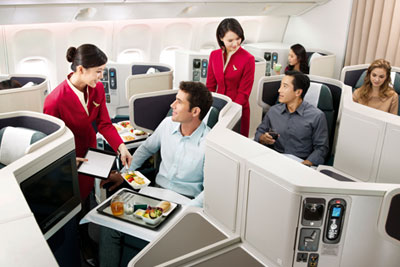Diploma In Cabin Crew
Duration
36h
Students
0
Level
Beginner
Last Updated
June 26, 2024
Available Seats
20

A Diploma in Cabin Crew typically refers to a specialized educational program designed to train individuals for careers as flight attendants or cabin crew members in the airline industry. These programs usually cover a range of topics essential for the role, including safety procedures, customer service skills, emergency protocols, in-flight service standards, and cultural awareness.
Here are some key aspects typically covered in such a diploma program:
1. **Safety and Emergency Procedures**: Training in handling various emergency situations such as medical emergencies, fire, evacuations, and turbulence.
2. **Customer Service Skills**: Teaching effective communication techniques, conflict resolution, and providing high-quality service to passengers.
3. **Cultural Awareness**: Understanding and respecting cultural differences and how they may impact interactions with passengers.
4. **Aviation Regulations**: Familiarization with aviation laws and regulations that govern airline operations and passenger safety.
5. **In-Flight Service**: Training in serving meals, beverages, and other in-flight services while maintaining airline standards.
6. **First Aid and CPR**: Basic training in first aid and cardiopulmonary resuscitation (CPR) procedures, which are crucial for handling medical emergencies on board.
7. **Security Procedures**: Understanding and implementing security measures to ensure the safety of passengers and crew.
8. **Teamwork and Crisis Management**: Developing teamwork skills and learning how to effectively manage stressful situations and crises.
These diploma programs are typically offered by aviation training academies, vocational schools, or through specialized programs at colleges and universities. They may vary in duration and specific curriculum depending on the institution and the country where the program is offered.
Successful completion of a Diploma in Cabin Crew can enhance employment prospects within the airline industry by providing candidates with the necessary skills and knowledge to perform effectively in the demanding role of a cabin crew member.
Typically, the curriculum covers a range of subjects that are crucial for success in aviation hospitality. These may include:
1. **Customer Service Excellence**: Teaching students how to interact with passengers courteously, efficiently, and in accordance with airline standards. This includes handling inquiries, managing complaints, and ensuring passenger comfort.
2. **Aviation Industry Overview**: Providing an understanding of the structure, operations, and key players in the aviation sector. This knowledge helps students contextualize their role within the broader industry.
3. **Safety and Security Procedures**: Educating students on safety protocols, emergency procedures, and security measures specific to aviation environments. This ensures that students are prepared to handle various situations professionally and responsibly.
4. **Communication Skills**: Developing strong communication abilities, both verbal and non-verbal, which are essential for effective interaction with passengers and colleagues in a dynamic and multicultural environment.
5. **Cultural Sensitivity**: Recognizing and respecting cultural differences among passengers and colleagues, ensuring interactions are inclusive and respectful.
6. **Practical Training**: Often, diploma programs include practical training components where students get hands-on experience in simulated or real aviation settings. This could involve role-playing scenarios, mock flights, or internships with airlines or airport service providers.
7. **Hospitality Management**: Elements of hospitality management such as catering, cabin services, and lounge operations may also be covered, emphasizing the importance of quality service delivery in enhancing passenger experience.
Upon completion of the Diploma in Aviation Hospitality, graduates are equipped to pursue careers as airline customer service agents, flight attendants, ground staff supervisors, airport lounge managers, and in various other roles within the aviation and hospitality sectors. The demand for skilled professionals in aviation hospitality continues to grow as air travel increases globally, making this diploma a valuable qualification for those aspiring to work in this exciting and fast-paced industry.
- 6 Sections
- 59 Lessons
- 1 Quizzes
- 36h Duration
Section 1
Section 2
Section 3
Section 4
Section 5
Section 6
₹ 35,000.00
Course Includes
- InstructorRam Singh
- Subject-AVIATION
- Enrolled146 students
- Duration36 hrs
- LanguageEnglish,Hindi
